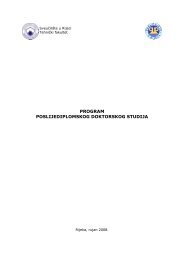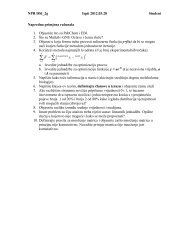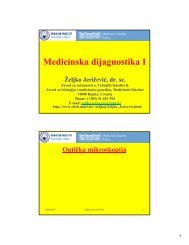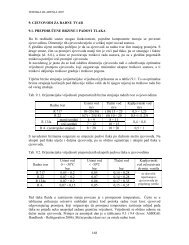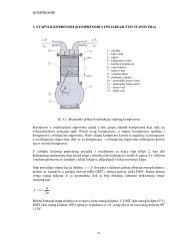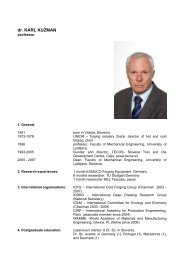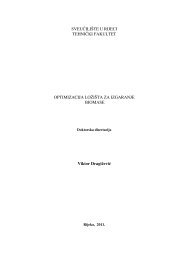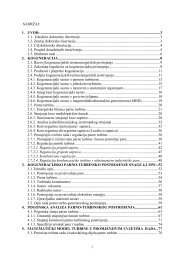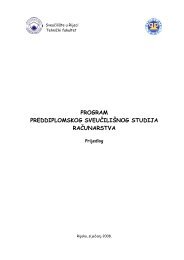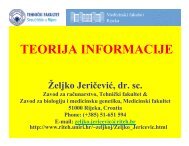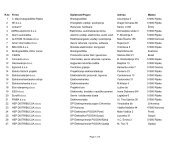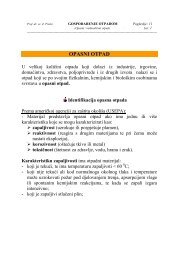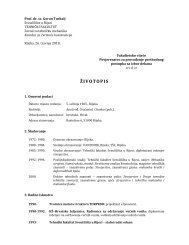universityâenterprise cooperation
universityâenterprise cooperation
universityâenterprise cooperation
Create successful ePaper yourself
Turn your PDF publications into a flip-book with our unique Google optimized e-Paper software.
4.1 Regional and national background<br />
The renewed Lisbon agenda aims to turn<br />
Europe into a modern, dynamic, outwardlooking<br />
knowledge economy. It acknowledges<br />
that this is the most effective means of<br />
delivering the economic growth and jobs<br />
required across Europe. Investment in<br />
education, research and innovation – the<br />
knowledge triangle - lies in the heart of<br />
successful economies and is relevant to all<br />
regions in the EU. It is widely accepted that<br />
there is a positive relationship between<br />
R&D investment, innovation and economic<br />
growth. Countries that invest in education,<br />
research and innovation have higher rates<br />
of economic growth and higher levels of<br />
productivity in the long-run, particularly<br />
where this is embedded in a well-functioning<br />
innovation system. This can be the case for<br />
both the prosperous and less-prosperous<br />
regions of the EU, as well as surrounding<br />
regions. Not all regions have the same<br />
level of capacity to undertake research<br />
and innovation, impeding their long-term<br />
growth prospects and contributing to<br />
disparities in prosperity across the EU.<br />
It should be mentioned that the aims of<br />
Lisbon strategy are also relevant for the<br />
Western Balkan Countries (WBC) which<br />
are expected to incorporate it into their<br />
reform agendas. In the knowledge triangle<br />
of education, research and innovation,<br />
universities play a special role in promoting<br />
European standards in education and<br />
training. WBC have been already included<br />
in the main European processes within<br />
areas of education and vocational training,<br />
research and usage of ICT technologies, at<br />
national as well as regional level. These<br />
countries conduct reforms in accordance<br />
with Bologna and Copenhagen processes,<br />
they have signed regional <strong>cooperation</strong><br />
documents, they participate partially or<br />
fully in community programmes or special<br />
programmes of EU in the area of education,<br />
research and technologies (TEMPUS, FP6,<br />
FP7, Youth, Erasmus Mundus, LLL etc.), as<br />
well as in the other forms of the regional<br />
<strong>cooperation</strong>, such as university and/<br />
or research networks of SEE: CEEUN, CEI<br />
UniNET, SEE-ERA.NET, ERI SEE etc.<br />
4.1.1 Education side<br />
Many WBC universities have not succeeded<br />
in making the transition from educational<br />
to research institutions and remain pure<br />
“colleges” of teaching. With the Bologna<br />
Process, this transition is required in order to<br />
harmonize with the European education area.<br />
Extensive <strong>cooperation</strong> between academic<br />
institutions from the Western Balkans and<br />
the EU Member States in the field of higher<br />
education is taking place under the Tempus<br />
programme. TEMPUS funds are of respective<br />
size to support the modernization and<br />
restructuring of universities in WBCs.<br />
According to the estimate of EU experts,<br />
links between university and industry must<br />
be strengthened in order to bridge the gap<br />
between business needs and university<br />
services in the area of education and research,<br />
to enable permanent transfer of knowledge,<br />
to increase financing of innovation.<br />
Therefore, it is essential to seek and unlock<br />
“technological brokers” – entities which<br />
deal with vocational education, research,<br />
transfer of knowledge and technologies, and<br />
boosting international <strong>cooperation</strong>.<br />
Upon an initiative by the Task Force<br />
Education and Youth of the Stability<br />
Pact the ministers of education and higher<br />
education from the SEE region and Moldova<br />
signed a Memorandum of Understanding<br />
in 2004, in compliance with the goals of<br />
the Lisbon strategy and the “Education and<br />
Training 2010” programme. The Education<br />
Reform Initiative of South Eastern Europe<br />
(ERI SEE) is the main instrument for the<br />
implementation of activities within the<br />
Memorandum, established as a regional<br />
platform for co-operation in the fields of<br />
education and training, is intended to<br />
serve as an interface between the national<br />
reforms in SEE and current trends in EU.<br />
Through fostering regional co-operation and<br />
facilitating capacity building and know-how<br />
transfer, ERI SEE promotes common European<br />
35<br />
Current state in the WBC region 4



